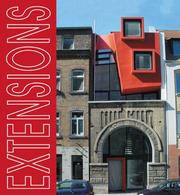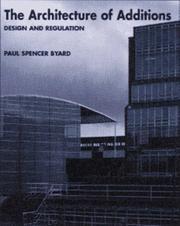| Listing 1 - 10 of 55 | << page >> |
Sort by
|
Book
Abstract | Keywords | Export | Availability | Bookmark
 Loading...
Loading...Choose an application
- Reference Manager
- EndNote
- RefWorks (Direct export to RefWorks)
Despite the widespread prevalence and economic importance of tall buildings, little is known about how their patterns vary across space and time. This paper focuses on vertical real estate, aiming to quantify differences across major world regions over time (1950-2020). The paper exploits a novel database on the location, height (above 55 meters), and year of construction of nearly all the tall buildings in the world. It proposes a new methodology to estimate the extent to which some world regions build up more than others given similar economic and geographic conditions, city size distributions, and other features. The analyses reveal that many skylines may visually appear more prominent than they really are once all the tall buildings and core controls are included, which alters how regions are ranked in terms of tall building stocks. Using results by city size, centrality, height of buildings, and building function, the paper classifies world regions into different groups, finding that international tall building stocks are mostly driven by boring skylines of residential high-rises, and to a lesser extent exciting skylines of skyscrapers and supertall office towers. Finally, land use regulations and preferences, not historical preservation nor dispersed ownership, likely account for most of the observed differences.
Buildings --- Additions.
Book
ISBN: 9783869227085 Year: 2019 Publisher: Berlin DOM publishers
Abstract | Keywords | Export | Availability | Bookmark
 Loading...
Loading...Choose an application
- Reference Manager
- EndNote
- RefWorks (Direct export to RefWorks)
This monograph discusses the role that ruins play in urban centers in terms of their meaning, testimony, and value, and the opportunities they provide. After an outline of historical and contemporary of approaches, with a special analysis of British and Italian approaches, Elisa Pilia puts forward a methodology for the investigation of the strategic values of such artifacts, and ideas for their potential contribution to a sustainable requalification of historic urban cores. The protocol is tested on the historical center of Cagliari, a midsized port city on the southern coast of the island of Sardinia, Italy, where the remains left by aerial bombardment during the Second World War are still a dramatic part of the controversial European debate on how to reuse ruins.
Architecture --- Buildings --- Aesthetics --- Additions
Book
Publisher: Haarlem Focus
Abstract | Keywords | Export | Availability | Bookmark
 Loading...
Loading...Choose an application
- Reference Manager
- EndNote
- RefWorks (Direct export to RefWorks)

ISBN: 8496263525 Year: 2006 Publisher: Barcelona Carles Broto
Abstract | Keywords | Export | Availability | Bookmark
 Loading...
Loading...Choose an application
- Reference Manager
- EndNote
- RefWorks (Direct export to RefWorks)
Architecture --- architecture [discipline] --- additions [general components] --- dwellings

ISBN: 9789004509245 9789004047563 9004047565 Year: 1976 Publisher: Leiden; Boston : BRILL
Abstract | Keywords | Export | Availability | Bookmark
 Loading...
Loading...Choose an application
- Reference Manager
- EndNote
- RefWorks (Direct export to RefWorks)
Book
ISBN: 9783936681888 3936681880 Year: 2015 Publisher: Stuttgart : Edition Axel Menges,
Abstract | Keywords | Export | Availability | Bookmark
 Loading...
Loading...Choose an application
- Reference Manager
- EndNote
- RefWorks (Direct export to RefWorks)
This book examines the application of the principle of layering in architecture, its mechanics, possible application and meaning. Layering is widely used in the discussions of the 20th and 21st centuries architecture but rarely defined or examined. Layering bridges the tectonics of structure and skin, offers a system for the creation of different architectural spaces over time and functions as a design principle without hierarchy. Three types of layering are identified: a chronological sedimentation of planes materializing changes over time (temporal layering), the additive sequence of spaces (spatial layering), and the stratification of individual planes (material layering). Like a palimpsest, historic cities frequently reveal temporal layering and aspects of change over time, a condition familiar to archaeologists who study layer upon layer of remnants of civilisation, including architectural remains and urban organization. In historic cities, one can read at least the most recent layers to determine a physical chronology of the city's history; contemporary architects add strata of the 21st century. Cities are composed of several layers, offering a complex understanding of time in which a view of the present includes also the perception of the past. At a building scale, layers can be part of the spatial composition, multiple elements of walls, the skin, the structure or decorative and narrative elements. Just as the position and order of geological strata contain information related to their age, formation, and origin, the position and form of architectural layers come with information about their function, intellectual scope, and provenance. The possible elements of such an architectural strategy include materials, light, water, and color as well as associations, memories, and analogies embedded in the layers or in the voids between them. Material layering is based on a perceived separation of spatial enclosures into floor, wall, and ceiling or roof elements and combinations thereof. Individual elements may consist of multiple planes fulfilling a series of specific functions. The architectural enclosure can represent the physical wrapper of a building and might transport the structures narrative, tectonic information, cultural expression, the architects design intent, and other topics that might be embedded.
Architectural design. --- Buildings --- Facades --- Design architectural --- Constructions --- Façades --- Additions --- Agrandissements

ISBN: 1555952011 155595202X Year: 2001 Publisher: New York : Hudson Hills Press ;,
Abstract | Keywords | Export | Availability | Bookmark
 Loading...
Loading...Choose an application
- Reference Manager
- EndNote
- RefWorks (Direct export to RefWorks)
Art --- Buildings --- Additions --- Calatrava, Santiago, --- Milwaukee Art Museum

ISBN: 0393730212 Year: 1998 Publisher: New York, N.Y. Norton
Abstract | Keywords | Export | Availability | Bookmark
 Loading...
Loading...Choose an application
- Reference Manager
- EndNote
- RefWorks (Direct export to RefWorks)
Architecture --- Buildings --- Add-ons, Building --- Additions, Building --- Building add-ons --- Building additions --- Building extensions --- Extensions, Building --- Decision-making in architecture --- Architectural aesthetics --- Aesthetics, Architectural --- Aesthetics --- Decision making --- Additions --- Add-ons --- Extensions --- architecture [discipline] --- aesthetics --- architectural theory --- architectuurtheorie --- esthetica --- architectuur
Book
ISBN: 4871401936 Year: 2006 Publisher: Tokyo A.D.A. Edita
Abstract | Keywords | Export | Availability | Bookmark
 Loading...
Loading...Choose an application
- Reference Manager
- EndNote
- RefWorks (Direct export to RefWorks)
additions [general components] --- theaters [buildings] --- Architecture --- Stage design. Scenography --- Nouvel, Jean --- France --- museumarchitectuur
Book
Abstract | Keywords | Export | Availability | Bookmark
 Loading...
Loading...Choose an application
- Reference Manager
- EndNote
- RefWorks (Direct export to RefWorks)
Depuis des siècles, les extensions de petites dimensions représentent une source indispensable d’activité pour les architectes, mais elles sont rarement reconnues à leur juste valeur et le plus souvent négligées par les revues d’architecture ou de décoration. Aujourd’hui les choses ont changé. Sous l’effet de plusieurs facteurs, à commencer par la flambée des prix de l’immobilier et la flexibilité des styles de vie, les ajouts ou modifications de l’espace d’habitation sont devenus l’un des domaines les plus féconds de l’innovation en architecture. Ce livre présente une quarantaine d'extensions conçues par des architectes dans onze pays. Chaque exemple détaille les besoins du client et la solution de l’architecte, ainsi que les principaux obstacles et problèmes rencontrés au cours de la conception et de la réalisation. Les résultats se distinguent par leur diversité et leur ingéniosité, mais tous ont donné une nouvelle vitalité et une valeur ajoutée au bâtiment d’origine. Les études de cas se répartissent en chapitres consacrés à divers types d’extensions suivant leur position : en surélévation, en sous-sol, latéralement ou à l’arrière. L’ouvrage inclut aussi des conseils pratiques pour aider les détenteurs d’une habitation à établir la définition de l’ouvrage, trouver un architecte et réduire les coûts du chantier. Armadale House, Jakckson Clements Burrows Architects ; Maison à Brooklyn, Baumann Architecture ; Chambre Lilloise, Isabelle Menu et Luc Saison ; Penthouse allégé, Hartwig N. Schneider Architekten ; Penthouse de photographe, Christoff:Finio Architecture ; Haus Ray 1, Delugan Meissl Associated Architects ; Chambres sur le toit, Tectône ; Espace récréatif en sous-sol, Granit Chartered Architects ; Vermont Avenue House, Aidlin Darling Design ; Villa du Lac de Bled, Ofis Arhitekti ; Maison-violon, Cassandra Complex ; Extension symbiotique Friedrich, FloSundk architektur+urbanistik ; South Hill Park, Robert Dye Associates ; Bell-Simpson House, Nord Architecture ; Caristo House, Sam Crawford Architects ; Extension arrière à Clifton Hill, Adam Dettrick ; Lee Residence, Public ; Maison patio, Michelle Pasquier ; Pièce familiale arrière, Map Projects Ltd ; Solar Umbrella House, Pugh+Scarpa ; Tall Acres, Studio for Architecture ; Pilgrim's Lane, Eldridge Smerin ; Atelier d'artiste, Joseph Llobet ; Casa A-F, exe.arquitectura ; Annexe CG, Francesc Rifé SL ; Dirk Cove House, Níall McLaughlin ; Maison Frankfort, Atelier d'architecture Pierre Hebbelinck ; Nouvelle cabaña, Hidalgo Hartmann ; Ranch House, Nick Noyes architecture ; Villa 57+ , ArchiFactory.de ; Maison du docteur Gabka, Landau+ Kindelbacher Architekten ; Loft sur Duane Street, Marpillero Pollak Architects ; Terrasse à Manhattan, Studio Renaldi ; Terrasse et piscine, Mûrisserie Parent-Rachdi ; Casa pR34, Rojkind Arquitectos ; Maison-acordéon, 24H Architecture ; Loftcube, studio Aisslinger ; Maison-sac à dos, Stefan Eberstadt ; Chambre suspendue, Emmanuel Combarel Dominique Marrec Architectes
Buildings --- Constructions --- Additions --- Agrandissements --- Maison individuelle --- Extension de bâtiment --- Architecture domestique --- Extensions --- Réfection --- Réfection
| Listing 1 - 10 of 55 | << page >> |
Sort by
|

 Search
Search Feedback
Feedback About UniCat
About UniCat  Help
Help News
News